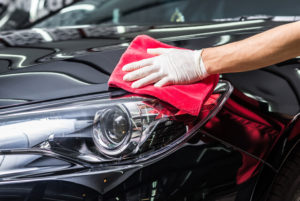3 Big Reasons Why You Should NOT Wash Your Houston Car At Home
At first, washing your car at home seems like the greener option. However, the truth of the matter is very far from this; here’s why.
 1. You Use More Water
1. You Use More Water
For most people, washing a car at home entails scrubbing the car with a rag and hosing the down water to rinse. Depending on the water flow rate at the hose, you could end up wasting hundreds of gallons of water during the washing process.
Automatic washing use between 40 gallons and 60 gallons of water to wash a single car. Importantly, it is still effective. Water is sprayed using high-intensity nozzles, resulting in less water usage whilst effectively getting rid of the grime.
Water efficiency increasing considerably at self-serve car washes. These are installation where car owners pay using coins to use the spray gun in washing off their cars. The water usage rate in such installation range from 12 to 18 gallons of water per car.
SOAP Hand Car Wash uses as few as 10 gallons of water per wash, while the average tunnel car wash can use between 40 to 80+ gallons, and washing a car at home can use 100 gallons or more.
2. You End Up Wasting A Lot Of Water
Washing your care at on your parking lot, driveway, or on the street means that the water you use in washing your car simply runs off into the sewer system. This is different for car wash as the water is captured and recycled for use on the spot or later on for the first rinse-off. Alternatively, the waste-water is captured and sent to a wastewater treatment plant for purification, allowing the water to be used in all aspects of washing at the car wash again.
3. You Pollute More Water
While washing a car, the water dissolves a wide variety of chemical pollutants. In addition to the grime and dirt that covers the car, the water will interact and in some cases dissolve automobile fluids such as antifreeze, oil, and transmission fluid. The car wash detergent will also contain washing chemicals such as naphthalene, hydrochloric acid, phosphates, methylene chloride, and sulfuric acid. Letting these chemicals run off into the sewer means letting such chemicals end in our waterways. They ultimately pollute our drinking water and destroy marine habitats which affects fish, birds, marine flora and much more.
That said, if you still want to clean your car at home, you should strive to be water smart by:
Limit how long you keep the water hose running – Just fill a bucket of water and add soap. Use a sponge to wash one section of your car. Rinse that section with a high-intensity water-efficient nozzle and thereafter turn the water off. This will reduce the length of time the nozzle is running. As for the soapy and dirty water, pour it into a utility sink or the toilet to ensure the water ends up in a water treatment plant.
Park your car on a lawn or gravel instead of a driveway. These are surfaces that absorb the run-off water.
Buy non-toxic cleaners that will effectively cut the grease and grime without polluting water. Such cleaners are fragrance-free, biodegradable, and phosphate-free, very similar to cleaners you wash your dishes with. They are still effective in washing your car.
Apply some more “elbow” grease. Buy a reusable sponge with a soft scrubber on of its side to help scrub the persistent dirt such as bird poo without scratching the paint rather than buying more powerful detergent.
Use plant-based and fragrance-free cleansers to clean the interior. For the most part, car washes will use industrial-grade detergent to clean the interior. For a better experience, invest in plant-based sprays that will leave little to no chemical residuals that typically cause headaches. It is important to keep your windows open for a while after cleaning the inside to aerate the inside of your car.
SOAP Hand Car Wash is an eco-friendly, car wash and detailing service that serves the Greater Houston area.


